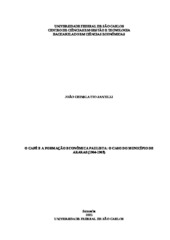| dc.contributor.author | Santilli, João Chinelatto | |
| dc.date.accessioned | 2022-10-03T14:23:38Z | |
| dc.date.available | 2022-10-03T14:23:38Z | |
| dc.date.issued | 2022-09-23 | |
| dc.identifier.citation | SANTILLI, João Chinelatto. O café e a formação econômica paulista: o caso do município de Araras (1904-1905). 2022. Trabalho de Conclusão de Curso (Graduação em Ciências Econômicas) – Universidade Federal de São Carlos, Sorocaba, 2022. Disponível em: https://repositorio.ufscar.br/handle/ufscar/16772. | * |
| dc.identifier.uri | https://repositorio.ufscar.br/handle/ufscar/16772 | |
| dc.description.abstract | The present work seeks to analyze the coffee agricultural formation in the state of São Paulo, focusing on the case of Araras in the period between 1886 and 1905. Approaching topics as what is the impact of the coffee complex on the socioeconomic formation of the city of Araras in the beginning of the century XX, the importance the immigration flow in the process of agricultural formation and agricultural transition in the state and how the coffee crises impacted the agricultural distribution of Araras. Through the analysis of data from the Agricultural and Zootechnical Statistics of Araras in the Agricultural year 1904-1905 provided
by the Secretary of Agriculture, Commerce and Public Works of the State of São Paulo, it is possible to analyze and make attestation regarding the process of formation of the coffee complex in the state of São Paulo and referring to the case of the municipality of Araras in the period between 1886 and 1905. It is possible to observe that the formation of the coffee production structure attracted the immigrant who at first met the needs of manpower but was also extremely importance in the formation of the urban center, mainly in the supply of supplies for the local population through commercial establishments and with the production of other agricultural products. The results indicate that there was a trend of productive decline of coffee in the city of Araras at the beginning of the 20th century, which is possible to identify through the data analyzed in the agricultural year of 1904-1905, originated among other factors by triggering the crises of coffee overproduction, fall of the international price of coffee and the aging of plantations, this observation is also evidenced by the movement of fragmentation of agricultural land and the transition from monoculture to polyculture, often carried out by new foreign owners. | eng |
| dc.language.iso | por | por |
| dc.publisher | Universidade Federal de São Carlos | por |
| dc.rights | Attribution-NonCommercial-NoDerivs 3.0 Brazil | * |
| dc.rights.uri | http://creativecommons.org/licenses/by-nc-nd/3.0/br/ | * |
| dc.subject | Araras | por |
| dc.subject | Café | por |
| dc.subject | Complexo cafeeiro | por |
| dc.subject | Imigração | por |
| dc.subject | Formação cafeeira | por |
| dc.subject | Coffee | eng |
| dc.subject | Coffee complex | eng |
| dc.subject | Immigration | eng |
| dc.subject | Coffee formation | eng |
| dc.title | O café e a formação econômica paulista: o caso do município de Araras (1904-1905) | por |
| dc.title.alternative | Coffee and the economic formation of São Paulo: the case of the municipality of Araras (1904-1905) | eng |
| dc.type | TCC | por |
| dc.contributor.advisor1 | Silva, Gustavo Pereira da | |
| dc.contributor.advisor1Lattes | http://lattes.cnpq.br/2439816100723730 | por |
| dc.description.resumo | O presente trabalho busca analisar a formação agrícola cafeeira do estado de São Paulo, focando no caso de Araras no período entre 1886 e 1905. Abordando tópicos como o impacto do complexo cafeeiro na formação socioeconômica do município de Araras no início do século XX, a importância da corrente imigratória no processo de formação e transição agrícola do estado e como as crises do café impactaram na distribuição agrícola do município estudado. Por meio da análise dos dados da Estatística Agrícola e Zootécnica de Araras no ano Agrícola de 1904-1905 fornecido pela Secretária da Agricultura, Comércio e Obras Públicas do Estado de São Paulo, foi possível analisar e realizar apontamentos referente ao processo de formação do complexo cafeeiro no estado de São Paulo e referentes ao caso do município de Araras no período entre 1886 e 1905. É possível observar que formação da estrutura produtiva do café atraiu o imigrante que no primeiro momento supriu as necessidades de mão de obra, mas também foi de extrema importância na formação do centro urbano, principalmente no abastecimento de suprimentos para a população local através de estabelecimentos comerciais e com a produção dos demais produtos agrícolas. Os resultados apontam que existe uma tendência de decadência produtiva do café no município de Araras no início do seculo XX que é possível identificar através dos dados analisados no ano agrícola de 1904-1905, originado entre outros fatores por desencadeamentos das crises de superprodução cafeeira, queda do preço internacional do café e do envelhecimento das plantações, essa observação é evidenciada também pelo movimento de fragmentação das terras agrícolas e a transição da monocultura para a policultura, com frequência realizada por novos proprietários estrangeiros. | por |
| dc.publisher.initials | UFSCar | por |
| dc.subject.cnpq | CIENCIAS SOCIAIS APLICADAS::ECONOMIA::TEORIA ECONOMICA | por |
| dc.publisher.address | Câmpus Sorocaba | por |
| dc.publisher.course | Ciências Econômicas - CEc-So | por |

